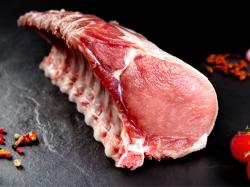New Study Finds Lean Red Meat Can Support Heart Health
July 3, 2018 | 3 min to read

DES MOINES, IA – According to new research published inthe American Journal of Clinical Nutrition, following a Mediterranean-styleeating pattern that incorporates lean red meat can reduce cardiovascular disease risk factors.
The study compared Mediterranean-style eating patterns with red meat intake from the typical amount, 3 ounces per day, to a lower intake amount, 3 ounces twice per week. The research showed that consuming up to 18 ounces of lean red meat per week lowered cholesterol and lowered blood pressure while following the Mediterranean-style eating pattern.
“Participants’ LDL cholesterol, which is one of the strongest predictors we have to predict the development of cardiovascular disease, improved with typical but not lower red meat intake,” said Lauren E. O’Connor, lead author and a student at Purdue University. “Overall, heart health indicators improved with both Mediterranean-style eating pattern.”
The 41 study participants, 28 females and 13 males, completed the three-phase study. In the first phase, each participant consumed a Mediterranean-style eating pattern containing three ounces per day of lean red meat for a five-week period. The next phase also lasted five weeks and the participants returned to their regular eating pattern. In the third phase, the participants consumed a Mediterranean-style eating pattern with less red meat- only three ounces twice per week. The order of the typical and lower red meat consumption phases were randomly assigned.
The study concluded that adults who are overweight or moderately obese may improve multiple cardiometabolic disease risk factors by adopting a Mediterranean-style eating pattern with or without reductions in red meat intake when red meats are lean and unprocessed.
Eight cuts of pork meet the USDA’s guidelines for “lean,” and the popularpork tenderloin, also used in the study, has the same amount of fat as a skinless chicken breast.
For recipies incorporating lean pork into Mediterranean-style meals, includingMediterranean Pork Kabobs and Herb-Crusted Mediterranean Pork Tenderloin, visit www.yummly.com/page/pork.
The National Pork Board has responsibility for Checkoff-funded research, promotion and consumer information projects and for communicating with pork producers and the public. Through a legislative national Pork Checkoff, pork producers invest $0.40 for each $100 value of hogs sold. Importers of pork products contribute a like amount, based on a formula. The Pork Checkoff funds national and state programs in advertising, consumer information, retail and foodservice marketing, export market promotion, production improvement, science and technology, swine health, pork safety and sustainability and environmental management.
For information on Checkoff-funded programs, pork producers can call the Pork Checkoff Service Center at (800) 456-7675 or check the Internet atwww.pork.org.
Source: National Pork Board
